#Vol 214
Text
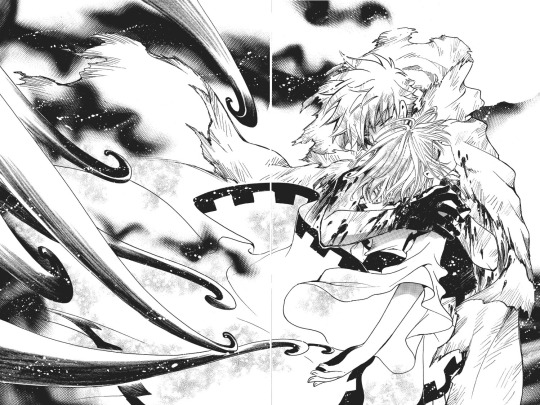
[5]
I AM CRYING I CAN’T BELIEVE HE DID IT
#YOU GOT ME CLAMP YOU GOT ME#HE GOT TO HER IN TIME#AFTER ALL THESE YEARS#Liveblogging the reservoir chronicle#Tsubasa#Vol 214#Lava Lamp Guy#Sakura#Which Sakura?#A Sakura!#Not Sakura#BUT A LIVING SAKURA#A RARITY IN THIS DAY AND AGE#He pulled her RIGHT OUT OF THAT VOID
60 notes
·
View notes
Text

#the panel they used for naruto 99#naruto#vol 24#ch 214#kankuro#sasuke recovery mission#everykankuro
46 notes
·
View notes
Text
I think we (Queer Christians) should bring back the Feast of Fools! Here's my pitch:
Medieval Christians celebrated the days following Christmas with societal inversion. If God became a vulnerable child born into poverty, then the best celebration should invert the social order: master and servant, clergy and laity, man and woman. The Feast of Fools–held on January 1st–was the most notable celebration of cosmic inversion. Developed in the late 12th and early 13th centuries, the tradition of the feasts continued until the 16th century. (1)
The festival is popularly misunderstood as a celebration of sacrilege, a result of its apparent burlesque of religion. Yet, the festival’s role reversals were prescribed by clergy, and the "fools" represented those chosen by God for their lowly status. From surviving 13th century manuscripts–notably, the Play of Daniel from Beauvais Cathedral and the Office of Joseph from Laon Cathedral–it is clear that some Catholic Churches in France sanctioned cross-dressing for liturgical purposes. (2) In fact, the Feast of Fools is remarkable for being sanctified rather than sacrilegious.
Many anthropologists of religion have argued that “sacred play,” or “ludic ritual,” is central to how religious behaviors function. (3) Although play may seem counterintuitive to religion, absurdity and holiness often go together, especially considering the role reversals and revelry of the Feast of Fools.
Literary critic Mikhail Bakhtin made a similar argument about the “carnivalesque.” (4) When absurdity is celebrated in religion–when a society’s usual rules are suspended–observant revelers can stretch the boundaries of their identities or reverse their social roles. Men become women; laity become clergy; God becomes a helpless infant; death becomes life. It is on the strength of the absurd that religions delve into hope and new ways of becoming. (5) “Sacred play” is reality altering work, a cornerstone of religious enlightenment and religious embodiment.
In 1969, theologian Harvey Cox proposed that an imitation of the medieval Feast of Fools could rejuvenate modern Christian spirituality, lamenting that the tradition has forgotten sacred play. (6)
As found in the Medieval Feast of Fools, the joy of inversion and freedom of death were, at one point, celebrated in Christian tradition through cross-dressing. Drag exists in Christian tradition as an artform that is capable of embodying the Divine. Sharing in Christ’s martyrdom is only part of Christian embodiment, and redemption and resurrection are essential to any imitation of Christ. Through embodying Christ, religious drag can become a project of resurrection.
(Taken from my Master's Thesis in Art History, "Crucifixion Can Happen To Anyone: Embodying Christ Through The Queer Artist")
1: “Feast of Fools.” n.d. Encyclopædia Britannica.
2: Harris, Max. 2011. Sacred Folly: A New History of the Feast of Fools. Cornell University Press. 113-127.
3: Turner, Victor. “Liminal to Liminoid, in Play, Flow, and Ritual: An Essay in Comparative Symbology.” Revista Mediações, vol. 17, no. 2 (2012): 214–57.
4: “Carnivalesque.” n.d. Oxford Reference. Accessed 12 July 2023.
5: Kierkegaard, Søren. “Fear and Trembling.” From Selections from the Writings of Kierkegaard. University of Texas, Austin, Texas, 1912.
6: Cox, Harvey. 1969. The Feast of Fools; a Theological Essay on Festivity and Fantasy. Harvard University Press
47 notes
·
View notes
Text
i've been rereading a lot of old supergirl comics lately, so i thought i'd make a post with some pre-crisis recommendations for kara <3
THE GIRL WITH THE SEE-THROUGH MIND!
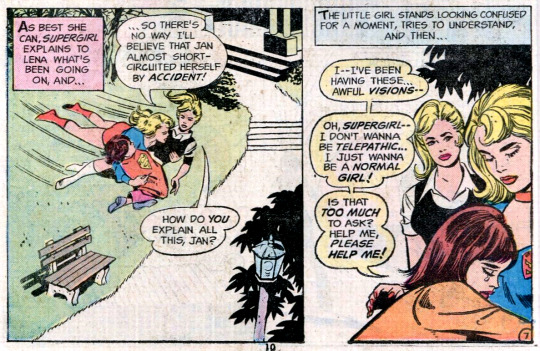
the superman family #168
kara and lena attempt to help a young empath as she suddenly feels compelled to kill herself. one of my fav issues for lena and one of the best storylines from kara's student advisor era. i also really love the relationship kara has with lena, both as linda danvers and as supergirl.
THE BRIMSTONE CONNECTION
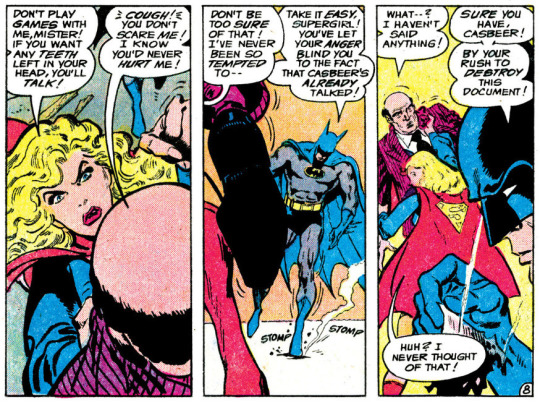
the brave and the bold #160
kara's foster father goes missing so she teams up with batman to track him down. i think kara and bruce have a fun dynamic together and i really like how she's characterized here. i do think that this issue kind of downplays how intelligent kara is in order to uplift bruce's detective skills, but regardless i think its a fun team-up.
THE SUPERGIRL GANG
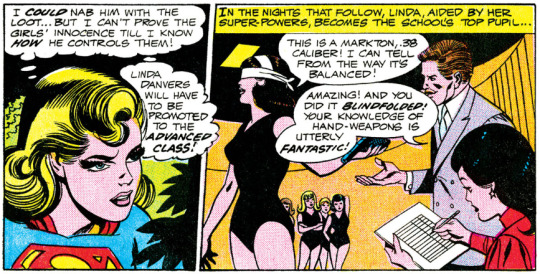
adventure comics #381
kara goes undercover at an all-girls crime fighting school to investigate a string of robberies committed unknowingly by the students. i really like how this issue focuses a bit on kara's investigative abilities and the things she can do better as linda danvers rather than as supergirl. also babs makes an appearance in this story (rise pre-crisis karababs warriors) <3
THE BATTLE FOR SURVIVAL!
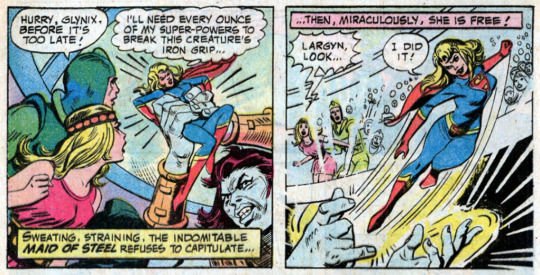
adventure comics #412
kara is chosen to fight in a ceremonial battle by a distant planet's ruler. this issue is SO fun and showcases kara's strength so well. it also features art from art saaf who is one of my favorite artists for pre-crisis kara :)
THE ATTACK OF THE ANNIHILATOR!
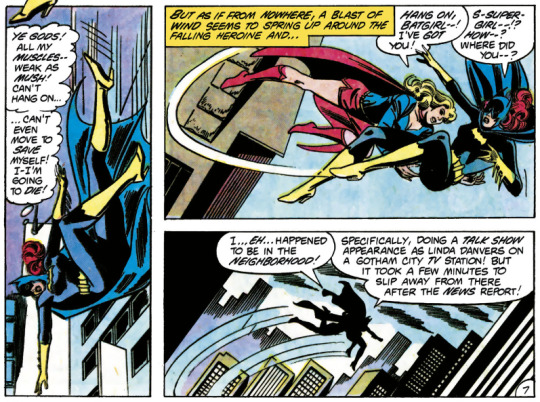
detective comics #508-510
kara flies to gotham and helps barbara gordon defeat a crazed and mutated scientist who calls himself the annihilator. unfortunately this is the only multi-issue arc kara and babs have together during pre-crisis (not counting crisis on infinite earths i guess), but i do really enjoy this story (again, rise pre-crisis karababs warriors).
A HEAD-FULL OF SNAKES!
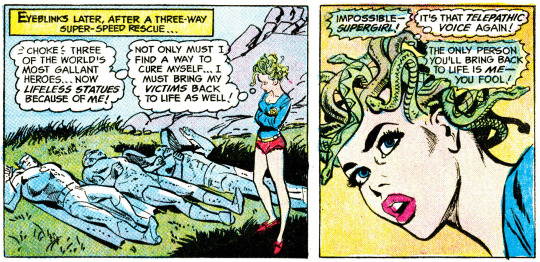
supergirl vol 1 #8
after portraying medusa in a play, a curse is placed on kara that turns her hair into snakes and anyone she looks at into stone. another really fun story :) this issue is definitely one of the best from supergirl vol 1.
CRYPT OF THE FROZEN GRAVES
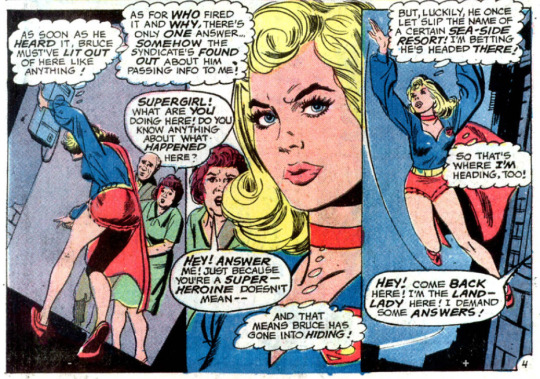
adventure comics #424
kara attempts to uncover the crimes of the san francisco syndicate by gathering information from a former criminal informer. the art in this issue is SO pretty and i really love how kara is characterized here <3 also features the last appearance of pre-crisis nasty luthor </3
THE VISITORS FROM THE VOID
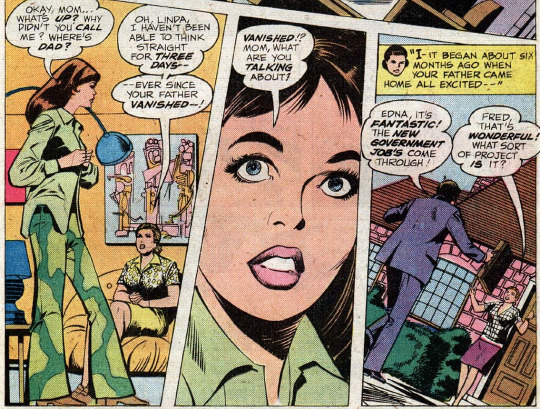
the superman family #184-186
when fred danvers mysteriously disappears after accepting a secret government job, edna danvers seeks out kara for help in finding him. i really love this storyline for how it develops the relationship between kara and her foster parents, and it's a great showcase of kara's anger and how protective she can be over the people she loves.
CELEBRATION!
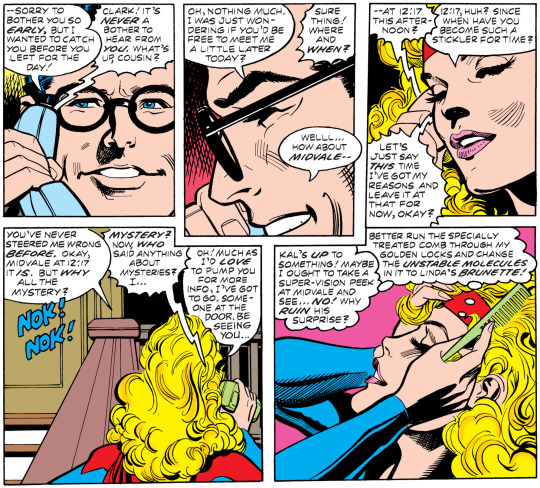
supergirl vol 2 #20
clark asks kara to meet him at midvale for a surprise—but before she can do that, kara must battle the parasite. kara's 25th anniversary issue :) you can also read action comics #555 before this if you'd like, it takes place concurrently with this issue but shows clark's pov.
and finally—i already included this story on my pinned post with other supergirl storyline recommendations, but i really like this arc so i'm putting it here too:
THE STRANGE REVENGE OF LENA LUTHOR!

the superman family #211-214
takes place within one of my favorite era’s for supergirl! kara (living as an actress in new york at the time) helps her old friend lena thorul get a job and a place to stay after lena’s husband dies. after the villain mind-bomber boost’s her psychic abilities, lena discovers kara’s secret identity.
70 notes
·
View notes
Photo

💕 Sparklecare Update 💕
VOL 3: Pages 212-214 🌈 Click here to read!
✨ Support us on Patreon!
✨ Updates Mondays & Thursdays
103 notes
·
View notes
Text
Ruthless Representatives, Unjust Executions (2/3): Tribunals and Arrests
In Part 1 of this series, I listed three memoirs that included details on Saint-Just condemning an artillery captain to death and described their inconsistencies. @josefavomjaaga has noted that the overall arc of the story is still true, which raises the question: did the captain actually get executed?
Dr. Lawrence Joseph Fischer, in his paper about Jourdan’s career in the Revolutionary army, says of this affair: "The evidence reveals that much of this was threat only; the artillery captain, for example, was never guillotined.” He adds in a footnote: "Such punishments were announced in each order of the day; no such execution, or even arrest, of any artillery captain was ever announced, either before or after Fleurus." (p. 214) If the artillery captain was executed, there would have to written evidence, because if there was one thing civilians were good at doing, it was paperwork!
Indeed, a look through official documents of the representatives, such as vol. 2 of the Œuvres completes of Saint-Just, turns up no news about the execution of an artillery captain. However, Saint-Just's Œuvres do contain correspondence and proclamations that Saint-Just made during his time as a representative in the Army of the Nord. The text shows that despite threatening executions around every corner, Saint-Just does not act on his word as much as expected.
First off, the decree for forming the extrajudicial military tribunals that Saint-Cyr condemned (cited by @josefavomjaaga in this post) indeed did exist. It was proclaimed on 4 May 1794, the second time Saint-Just and Le Bas went to the Nord. See pages 404, and 406-407, documents number 2. and 7., for more details.
7.
The Representatives of the People to the Army of the Nord decree the following:
Article 1. — The agents or partisans of the enemy who are found either in the Army of the Nord, or in the surroundings of this army, the prevaricating agents in all posts of the same army, will be shot in the presence of the army.
Article 2. — The military tribunal sitting at Réunion-sur-Oise is raised to this effect by the special and revolutionary Commission and will not, for the cases mentioned above, be subject to any particular form of procedure.
Article 3. — The tribunal will pronounce in the same manner in the fate of those imprisoned at Réunion-sur-Oise if they know agents or partisans of the enemy.
To Réunion-sur-Oise, 15 floréal, year II of the Republic one and indivisible.
LE BAS, SAINT-JUST.
(pp. 406-407)
Two further decrees of 21 floréal/10 May adds the military tribunal are authorised to print their verdicts, and affirms that “until further notice the military tribunal of the army will make judgements without being bound by the formality of the jury.” (pp. 413-414) Saint-Just and Le Bas give their reasoning in the following document of 27 floréal/16 May:
Proclamation to the Army of the Nord
Soldiers,
We call you back to rigourous dicipline, which alone can make you conquer, and which spares our blood; abuses have crept in among you; we have resolved to repress them. Those who provoke the infantry to disband in front of the enemy cavalry, those who leave the line before combat, during the combat, or during the retreat, will be arrested on the hour and punished by death. All cantonments will carry out patrols; they will recognise errant soldiers and arrest them; if they flee, they [the patrols] will fire. Soldiers, we will do you justice; we will punish those who refused it to you; we will share your work; but whoever deviates from his duty will be struck with a prompt death. […] (pp. 414-415)
These proclamations are extreme in its character, but I don’t doubt that indiscipline was occurring in the army. On 25 priarial/13 June, the Representatives specify that anyone convicted of having commandering supplies, implying that such excesses occurred, would be brought to the tribunal and punished with death (p. 430). We can debate whether the representatives’ proclamations were the cause of more privations and desertions, but there was reason for the representatives to watch the armies on the north-eastern frontier so closely. Fischer, in his paper on Jourdan, assesses the army of the Nord pre-Jourdan:
[...] the generals of the 'Nord' worked amid the aftereffects of the Dumouriez conspiracy. The sudden treason of the most powerful general of the Republic had shaken the government greatly. To men such as Robespierre and St Just, who had been weaned on the classics and the tales of military usurpers such as Sulla and Julius Caesar, all generals became objects of suspicion. [...] Because the 'Nord' had been Dumouriez'[s] army, its officers fell under particular scrutiny. The representatives with the 'Nord' were issued specific instructions to root out any who might have been Dumouriez'[s] accomplices. In such an atmosphere honest mistakes could easily be misconstrued as treasonous acts, and treasonous acts could bring execution to those who committed them. (pp. 48-49)
This also explains why so many specific accounts of representatives using disproportionate measures are found in memoirs of soldiers from the Nord, the Sambre-et-Meuse, and the Rhin-et-Moselle. By contrast, when recalling Toulon, Victor also mentions the representatives in his Memoires inédits, calling the representatives acclaimations "frenetic" and critizing revolutionary ideals as "bellicose" (p. 13), but his descriptions of the representatives are markedly less acerbic than Soult’s or Saint-Cyr's. The threats of the representatives of the Nord succeeded in creating an atmosphere of fear among the army cadres in the northeast, but whether they were uniformly as formidable across France is another question.
If the representatives did threaten officers with death, the fact remains to see if they carried it out, especially if there is printed evidence. Curiously, in Saint-Just’s oeuvres, I could only find two instances of dismissals and two instances of arrests, and none of them exhibit the bloodlust contemporary memoirists associate with Saint-Just. The first, dated 19 floréal/8 May, is this:
The Representatives of the People to the Army of the North decide that citizen Plaideux, general of brigade of the Army of the North, will retire to the Ministry of War, the Army of the Nord not having for the moment any need of his services. (p. 410)
So what happened to Plaideux? According to Georges Six’s Dictionnaire biographique des généraux et amiraux français de la Révolution et de l'Empire : 1792-1814, vol. 2, he was additionally issued an arrest warrant on 21 April of the same year. However, on 14 August, he assumed detachable command at Béthune, and on 6 November, he took up the post of general of brigade in the Laclaire devision (p. 318). In other words, he was back to work in three months. No executions here.
Saint-Just issued the other dismissal on 1 messidor/19 June:
Considering the citizen Capella, chef de brigade, commanding the 132nd demi-brigade, had neither the knowledge nor the energy necessary to fill a post so important;
That this demi-brigade, composed of bataillons who have acquired in the war the highest reputation, has been exposed to see its glory eclipsed by an unable leader and his character, notably on the day of the 28th of the previous month, under the very eyes of the Reperesentants of the people;
We decree that the citizen Capella will cease to be employed. He will present himself to the War Ministry his service records to obtain his retirement. (p. 433)
Next, the representatives promote Pouchin, captain of the 4th battalion of la Manche, in place of Capella, and orders that “all officers, non-commissioned officers, and soldiers acknowledge him and obey him according to military laws. Just like in Plaideux’s case, nowhere does Saint-Just order the execution of Capella, and despite Capella's incompetencies, Saint-Just does not sentence him to the extrajudicial military tribunal where he would have met certain death.
As for the arrest warrants, such as the one on 29 priarial/18 June, Saint-Just justifies them thus:
The Representatives of the People to the Armies of the Nord, the Moselle, and Ardennes,
On the account given to them by the general of division Kléber that, yesterday, the second battalion of the Vienne fled shamefully before the enemy, during which the flags of the other battalions from two divisions of the Army of the Nord flew on the road to victory, and that it ignored ther voice of the general who called him back to his post;
Considering that the crime cannot be of the entire battalion, because the bravery and the hatred of tyrants exist in the hearts of all the French and that, when a troop leaves their battle post, the cause is in the cowardice of officers or in the negligence of those tasked to maintain the discipline and to shape the soldiers they command to have a love of glory, which consists of braving the dangers of war and to conquer or to die at the post that the fatherland has conferred them;
Decree that the chef de bataillon and all the captains of the second battalion of the Vienne will be dismissed and put under arrest; They will be replaced on spot according to the law. The chief of staff will execute the present decree. (pp. 432-433)
While this may seem extreme, knowing Saint-Just’s fanatic reputation, we might have expected him to force the representatives and generals to put the whole battalion to death. Moreover, this decree shows that generals in high command "tip off" the representatives on military indiscipline for them to correct, which I am sure deserting during a victory would count as. That said, the civilian respresentatives' attempts to rectify this military indiscipline may have caused irritation among the officers.
Notice that the proclamation also does not condemn the rightfully arrested to the military tribunals, as the Representatives have promised earlier, and that for the second time, these dissmisals and arrests decree all procedures to be done in accordance to the law. It is far cry from the disregard the representatives seem to have for the law and for the words of the generals, as they say their declaration of the military tribunal. And when prisoners are to be tried, it is also according to "the law", as in this proclamation on 1 messidor/19 June.
The Representatives of the People to the Armies of the Nord, the Moselle, and Ardennes,
Approve the nomination made on the battlefield by the general of division Marceau of citizen Verger, captain of the carabiniers, to the rank of chef of the 1st battalion of the 9th demi-brigade of light infantry, and decree that the officer who commanded that battalion at that time and who refused to rally it despite the orders of the general, will be dismissed, put under arrest, and brought before the military commission established at the headquarters of the combined armies, to be judged in accordance to the law. The chief of staff is charged with executing this present decree. (pp. 434-435)
This proclamation raises a few questions. Is the military commission the same as the military tribunal, and if it is, is it following the laws of decree that the Representatives proclaimed on 15 floréal/4 May? If all the above are true, and Verger was found to be an agent of the enemy, then this is the only instance that the military tribunal had their hand in an execution.
Even so, Verger was not arrested for not being patriotic enough, but due to direct insubordination on the battlefield, as Marceau's actions indicate. Of course, Marceau may not have wanted to condemn his captain to arrest even with his insubordination, or one could argue that the representatives forced Marceau to denounce Verger. We would be here all day if we were to debate how much the representatives' paperwork differed from their historical actions. The bottom line is that despite all the threats the representatives have made about giving disobedient soldiers a prompt death, very few of the arrested individuals were made to appear before the military tribunals or were sentenced to death on paper. Furthermore, all the arrestations appear to be for actual offenses, even if said arrests are disproportionate to the offences.
Because of the comparatively lenient nature of the arrest warrants in Saint-Just's Œuvres, I am inclined to think tales of Saint-Just's ruthlessness, while not unfounded, are greatly exaggerated. Feel free to add any additional information.
33 notes
·
View notes
Text
La Fayette's Opinion on Court Martials
Tl;dr: La Fayette was much opposed to court martials.
This was intended as a post about La Fayette’s opinions on the death penalty and the reform of penal law – however, I think it is worthwhile to have a look at his opinion on court martials and the different systems used by different nations (France, England, America and to some extend Poland)
Now, La Fayette expressed his opinion for the first time in a written document that we knew of in a letter to George Washington on January 13, 1778. Although that is his first time expressing such notions to Washington, by the points that he raises it is evident that he has held these believes for some time. The trigger for La Fayette writing this letter was the court martial of two of his subordinate officers:
At the same [General] Court held 6th instant Captain Flagg charged with “neglect of duty 1st in suffering the Marquis de la Fayette, when Major Genl of the day to come in the night to the center of his Picquet, without being stopped or challenged; 2nd for permitting his sentries to have fires in his sight” was tried and acquitted by the unanimous opinion of the court. The Commander in Chief approves the sentence.
At the same Court held 7th instant Captn Laird, charged with “Neglect of duty, in suffering the Major General of the day to surprize him at his picquet in the night”—was tried & found guilty and sentenced to be dismissed from the service.
The Commander in Chief approves the sentence.
“General Orders, 13 January 1778,” Founders Online, National Archives, https://founders.archives.gov/documents/Washington/03-13-02-0180. [Original source: The Papers of George Washington, Revolutionary War Series, vol. 13, 26 December 1777 – 28 February 1778, ed. Edward G. Lengel. Charlottesville: University of Virginia Press, 2003, pp. 214–216.] (10/24/2023)
And here a screenshot from the notes beneath this letter to give some biographical information on the two men in question.

La Fayette wrote his letter the same day and described the situation as follows:
There were two gentlemen, same rank, same duty to perform, and same neglect of it who have been arrested the same day by me—as I went in the night around the piquets I found them in fault, and I gave an account of it the next day to your excellency—you answered that I was much in wrong not to have had them relieved and arrested immediately—I objected that it was then very late for such a changement, and that I did not know which was the rule in this army, but that the gentlemen should be arrested in that very moment—the last answer of your excellency has been, “they are to have a court martial, and you must give notice of it to the adjudant general”—therefore major nevill made two letters in order to arrest them, one for having been surprised in his post and the other, for the same cause and allowing his centrys to have fires which he could see in standing before the picquet. I give you my word of honor that there was not any exageration.
“To George Washington from Major General Lafayette, 13 January 1778,” Founders Online, National Archives, https://founders.archives.gov/documents/Washington/03-13-02-0186. [Original source: The Papers of George Washington, Revolutionary War Series, vol. 13, 26 December 1777 – 28 February 1778, ed. Edward G. Lengel. Charlottesville: University of Virginia Press, 2003, pp. 222–225.] (10/24/2023)
Beside his recalling of the situation, it can also be noticed that La Fayette was unfamiliar with the system of court-martials in America and used to different proceedings from his time in the French army.
Before we address La Fayette’s grievances with the court martial system in the Continental Army in general and with these cases in particular, here is his account of the proceedings in France:
(…) in france an officer is arrested by his superior, who gives notice of it to the commanding officer, and then he is punished enough in being deprived of going out of his room in time of peace, of doing his duty in time of war—no body knows of it but his comrades—when the fault is greater he is confined in a common room for prisonner officers and this is much more shamefull—notice of it is immediately given to the general officer who commands there—that goes too to the Kings minister who is to be reimplaced here by the commander in chief—in time of war it goes to the general in chief.
Soldiers are punished the same or next day by order of proper officers, and the right of punishing is proportionate to theyr ranks.
but when Both officers and soldiers have done something which deserves A more severe punishement, when theyr honor, or theyr life, or theyr liberty for more than a very short time is concerned, then a court martial meets, and the sentence is known—how will you let an unhappy soldier be confined several weeks, with men who are to be hanged, with spies, with the most horrid sort of people, and in the same time be lost for the duty, when they deserve only some lashes—then almost no proportion in the punishements.
Now, his first problem were the punishments – or better; lack thereof. You recall that Captain Ebenezer Flagg was acquitted:
now I See in the orders the less guilty punished in a manner, much too severe indeed, and dismised from the service (it is among all the delicate minds deprived of his honor) when he was only to be severely reprimanded, and kept for some time under arrest—but it can be attributed to a very severe discipline.
This acquittal was not only bothersome for La Fayette because Captain David Laird, who committed a less serious crime in La Fayette’s eyes, was so harshly punished. Part of the problem laid also in his perception of a gentleman’s word of honour:
what must I think of the same court when they unanimously acquit (it is to say that my accusation is not trüe) the officer who joins to the same fault, entirely the same, this of allowing his centrys to have fire in his own sight—for in every service being surprised or being found in the middle of his picquet without any challenging or stopping centry, as major nevil riding before me found him, is entirely the same thing—and mjor nevil riding before me when I was busy to make a centry pull off his fire, can swear that such was the case with that officer—he can do more than swearing, for he can give his word of honor—and I think that idea honor is the same in every country but the prejugées are not the same thing—for giving publickly the best of such a dispute (for here it becomes a trial for both parties) to an officer of the last military stage against one of the first, schould be looked on as an affront to the rank, and acquitting a man whom one other man accuses, looked upon as an affront to the person—it is the same in poland for count de pulaski was much affronted of the decision of a court martial entirely acquitting Colonel molens—however as I know the english costoms I am nothing else but surprised to see such a partiality in a court martial.
We read that La Fayette was not alone in his perception here and that other foreign officers, in this case Kazimierz Pułaski, were of the same opinion. His comment on the “english costoms” will be of some important later on.
But beside the critic he mentioned specifically in context of this affair, there were still more general points of criticism that La Fayette had – there were three points in total:
how is it possible to carry a gentleman before a parcel of dreadful judges at the same place where an officer of the same rank has been just now cashiered, for a trifling neglect of his duty, for, I suppose, speaking to his next neighbour in a maneuvre, for going into a house to speack to a pretty girl, when the army is on his march and thousand other things—how is it possible to bring to the certainty of being cashiered, or dishonored, a young lad, who has made a considerable fault because he had a light head, a too great vivacity, when that young man would be perhaps in some years the best officer of the army, if he had been friendly reprimanded and arrested for some time, without any dishonor.
the law is alwaïs severe, and bring with it an eternal Shamefull mark—when the judges are partial as in this occasion, it is much worse, because they have the same inconveniences as law itself.
in court martials men are judged by theyr inferiors—how (mutilated) to discipline I do’nt want to say—the publication exposes men to (mutilated) despised by the least soldier—when men have been before a court martial they schould be or acquitted or dismissed—what do you think can be produced by the half conndemnation of a general officer—what necessity for all the soldiers, all the officers, to know that general maxwell has been prevented from doing [h]is duty by his being drunk. Where is the man who will not laugh at him if he is told by him you are a drunkard and is it right to ridicule a man repectable by his rank, because he drank two or three gills of rum.
there are my reasons against court martials, when there is not some considerable fault to punish—according to my affair I am sorry in seeing the less guilty being the only one punished however, I shall send to court martials but for such a crimes, that there will be for the judges no way of indulgence and partiality. With the most tender respect I am Your excellency’s the most obedient servant
While La Fayette sounded almost a bit rebellious in his last sentence, it was not that he was entirely against court martials, he simply wanted them reserved for more serious offenses.
your excellency will certainly approuve my not arresting any officer for being brought before a court martial, for any neglect of duty, but when they will be robbers, or cowards, or when they will assassinate, in all when the[y] will deserve being cashiered or put to death.
The American system of court martials was molded after the English system and La Fayette was not quite happy with that either. Again, in the same letter to Washington from January 13, 1778 he wrote:
give me leave, to tell your excellency how I am adverse to court martials—I know it is the english costom, and I believe it is a very bad one—it comes from theyr love of lawers, speakers, and of that black apparate of sentences, and judgements—but such is not the american temper, and I think this new army must pick up the good institutions, and leave the bad ones where ever they may be (…)
Since I picked the letter so much apart, I will put a full and continuous version beneath the cut. :-)
Washington was not the only person, nor this the only incident where La Fayette expressed his displeasure about court martials. He wrote in a letter to Henry Laurens in his official position as President of Congress on March 20, 1778:
There as been a court martial for desertion which I din’t approuve of, but as among other men I have found sentenc’d of death, I beg from Congress to be empowered to relieve the man.
Idzerda Stanley J. et al., editors, Lafayette in the Age of the American Revolution: Selected Letters and Papers, 1776–1790, Volume 1, December 7, 1776–March 30, 1778, Cornell University Press, 1977, p. 365.
Despite being against court martials, La Fayette was naturally involved in a number of trials one way or another. He for example took part in two famous court martial cases, the cases of Charles Lee and Major John André. In Lee’s proceedings, La Fayette was a witness and wrote to Henry Laurens on July 6, 1778:
You have heard good deal, I dare say, of the court against Gal. Lee. I am very unwillingly an evidence in it but am happy enough as to have nothing material to say. This Gal. Lee is very much prejudic’d in favor of his english nation. If he is condemn’d, certainly he must be guilty of some thing very ugly.
Idzerda Stanley J. et al., editors, Lafayette in the Age of the American Revolution: Selected Letters and Papers, 1776–1790, Volume 3, April 27, 1780–March 29, 1781, Cornell University Press, 1980, p. 99.
Even in this short abstract La Fayette clearly states his opinion of General Charles Lee. It was not a very high opinion. He thought that Lee had acted badly during the battle, that he was prejudice, and that Washington was in the right when giving him a dressing down. Still, La Fayette was not in favour of the court martial and much resented being a part of it. We can see that his aversion for court martials, was not based on personal sympathies. He rejected these proceedings no matter the circumstances or the person accused.
Another great, but more complex, matter was the court martial of John André. La Fayette sat from September 29 to September 30, 1780 on the court martial of John André and was therefore among the men who found him guilty. He wrote to the Vicomte de Noailles (the husband of his sister-in-law) about his role in the proceeding on October 3, 1780.
But what has truly afflicted me is the necessity of hanging the adjutant general of the British army, a charming man who conducted himself throughout, and died, like a hero. This severity was necessary; the enemy acted very stupidly on this occasion, and since they lost that unfortunate man, the soul of their army, they have not written one letter that had common sense. Andre was executed yesterday. General Clinton’s anger does not frighten us, but this man's death, although inevitable in my opinion, left me with a feeling of sadness and respect for his character. I truly suffered in condemning him; but he was an officer under disguised clothing and name, passing within our posts with papers full of intelligence for the enemy, and he himself did not hesitate to recognize himself as a spy.
Idzerda Stanley J. et al., editors, Lafayette in the Age of the American Revolution: Selected Letters and Papers, 1776–1790, Volume 3, April 27, 1780–March 29, 1781, Cornell University Press, 1980, p. 182.
La Fayette’s aversion to court martials meets here his personal sympathy and respect for John André and his opinions (although they were still very much developing at this point in time) about the death penalty.
Out of the recorded 3315 court martials recorded in the continental army during the War of American Independence, La Fayette was involved in a number of them. We dissected the cases of Flagg, Laird, Lee and André. A forage master under his command was tried on February 19, 1778:
At a General Court-Martial whereof Col. Cortlandt was President (Feby 19th 1778) Mr Edward Bennett Forage-Master in the Marquis La Fayette’s division tried for repeated neglect of duty in suffering the horses of the division to remain three days without Forage when there was Forage in the General Forage yard, and all the divisions in the Army drew, for neglecting to draw hay when to be got and for trusting to others what he should himself perform by which many horses in the division have perished and the whole of the teams rendered unfit for duty. (…) The Court are therefore unanimously of opinion that Mr Bennett has been neglectful of his duty in not getting forage for the horses of the division to which he belongs when it could have been procured whereby many of them have perished for the want of it, being a breach of Article 5th Section 18th of the Articles of War and they do sentence him to be dismissed from his employment in the forage department.
���General Orders, 24 February 1778,” Founders Online, National Archives, https://founders.archives.gov/documents/Washington/03-13-02-0555. [Original source: The Papers of George Washington, Revolutionary War Series, vol. 13, 26 December 1777 – 28 February 1778, ed. Edward G. Lengel. Charlottesville: University of Virginia Press, 2003, pp. 652–653.] (10/24/2023)
He also ordered the court martial of Lieutenant William Mills on September 15, 1780:
At a division General court martial the 15th instant by order of Major General Marquis de la Fayette, Colonel Swift President Lieutenant William Mills of Colonel Gematt’s regiment of Light Infantry was tried for “Disobedience of Orders” and unanimously acquitted.
“General Orders, 18 September 1780,” Founders Online, National Archives, https://founders.archives.gov/documents/Washington/03-28-02-0160. [Original source: The Papers of George Washington, Revolutionary War Series, vol. 28, 28 August–27 October 1780, ed. William M. Ferraro and Jeffrey L. Zvengrowski. Charlottesville: University of Virginia Press, 2020, pp. 222–223.] (10/24/2023)
He further ordered a court martial for Captain Wilkin on September 12, 1781:
At a General Court Martial assembled at Williamsburgh September 12th 1781 by order of Major General the Marquis de la Fayette Colonel Vose President—Captain Wilkin of Colonel Stewarts Battalion of the Pennsylvania line, charged by Col Stewart with riotous behavior in his tent at an unseasonable hour of the Night; with disobedience of orders in not desisting when ordered so to do by the field Officer of the day through the Adjutt Captain Vanhorn and for using language and conduct subversive of good order and Discipline, was tried and acquited.
The Commander in Chief approves the Opinion of the Court. Captain Wilkin is released from his Arrest.
“General Orders, 25 September 1781,” Founders Online, National Archives, https://founders.archives.gov/documents/Washington/99-01-02-07015. [This is an Early Access document from The Papers of George Washington. It is not an authoritative final version.] (10/24/2023)
La Fayette also was asked by General Wayne to approve a verdict by a court martial ordered by Wayne himself. The soldier in question, James Grant, was from Virginia and La Fayette was popular with the Virginias and Wayne not. Wayne wrote on August 10, 1781, the day after Grant’s trial:
Inclosed is the proceedings of a Genl. Court Martial. Was it held on a soldier belonging to the Pennsa. Line I should not have the least difficulty or a moments hesitation in Confirming it because if this Culprit should pass with Impunity-it may open a door to worse [occurrences?]. But as it is a private of the Virginia Line I beg leave to commit it to your Decission.
Idzerda Stanley J. et al., editors, Lafayette in the Age of the American Revolution: Selected Letters and Papers, 1776–1790, Volume 4, April 1, 1781–December 23, 1781, Cornell University Press, 1981, pp. 309-311.
Grant was found guilty of shooting Captain Abraham Kirkpatrick whom he allegedly found in bed with his wife.
This list is by no means intended to be conclusive, there were probably many more cases La Fayette was involved in, these were just the ones I could present after a relatively quick search. This is more meant to give you a felling for La Fayette’s behavior in such situations.
Marquis de La Fayette to George Washington, January 13, 1778:
dear general
I Schall make use in this particular instance of the liberty you gave me of telling freely every idea of mine which could strike me as not being useless to a better order of things.
There were two gentlemen, same rank, same duty to perform, and same neglect of it who have been arrested the same day by me—as I went in the night around the piquets I found them in fault, and I gave an account of it the next day to your excellency—you answered that I was much in wrong not to have had them relieved and arrested immediately—I objected that it was then very late for such a changement, and that I did not know which was the rule in this army, but that the gentlemen should be arrested in that very moment—the last answer of your excellency has been, “they are to have a court martial, and you must give notice of it to the adjudant general”—therefore major nevill made two letters in order to arrest them, one for having been surprised in his post and the other, for the same cause and allowing his centrys to have fires which he could see in standing before the picquet. I give you my word of honor that there was not any exageration.
now I See in the orders the less guilty punished in a manner, much too severe indeed, and dismised from the service (it is among all the delicate minds deprived of his honor) when he was only to be severely reprimanded, and kept for some time under arrest—but it can be attributed to a very severe discipline.
what must I think of the same court when they unanimously acquit (it is to say that my accusation is not trüe) the officer who joins to the same fault, entirely the same, this of allowing his centrys to have fire in his own sight—for in every service being surprised or being found in the middle of his picquet without any challenging or stopping centry, as major nevil riding before me found him, is entirely the same thing—and mjor nevil riding before me when I was busy to make a centry pull off his fire, can swear that such was the case with that officer—he can do more than swearing, for he can give his word of honor—and I think that idea honor is the same in every country but the prejugées are not the same thing—for giving publickly the best of such a dispute (for here it becomes a trial for both parties) to an officer of the last military stage against one of the first, schould be looked on as an affront to the rank, and acquitting a man whom one other man accuses, looked upon as an affront to the person—it is the same in poland for count de pulaski was much affronted of the decision of a court martial entirely acquitting Colonel molens—however as I know the english costoms I am nothing else but surprised to see such a partiality in a court martial.
your excellency will certainly approuve my not arresting any officer for being brought before a court martial, for any neglect of duty, but when they will be robbers, or cowards, or when they will assassinate, in all when the[y] will deserve being cashiered or put to death.
give me leave, to tell your excellency how I am adverse to court martials—I know it is the english costom, and I believe it is a very bad one—it comes from theyr love of lawers, speakers, and of that black apparate of sentences, and judgements—but such is not the american temper, and I think this new army must pick up the good institutions, and leave the bad ones where ever they may be—in france an officer is arrested by his superior, who gives notice of it to the commanding officer, and then he is punished enough in being deprived of going out of his room in time of peace, of doing his duty in time of war—no body knows of it but his comrades—when the fault is greater he is confined in a common room for prisonner officers and this is much more shamefull—notice of it is immediately given to the general officer who commands there—that goes too to the Kings minister who is to be reimplaced here by the commander in chief—in time of war it goes to the general in chief.
Soldiers are punished the same or next day by order of proper officers, and the right of punishing is proportionate to theyr ranks.
but when Both officers and soldiers have done something which deserves A more severe punishement, when theyr honor, or theyr life, or theyr liberty for more than a very short time is concerned, then a court martial meets, and the sentence is known—how will you let an unhappy soldier be confined several weeks, with men who are to be hanged, with spies, with the most horrid sort of people, and in the same time be lost for the duty, when they deserve only some lashes—then almost no proportion in the punishements.
how is it possible to carry a gentleman before a parcel of dreadful judges at the same place where an officer of the same rank has been just now cashiered, for a trifling neglect of his duty, for, I suppose, speaking to his next neighbour in a maneuvre, for going into a house to speack to a pretty girl, when the army is on his march and thousand other things—how is it possible to bring to the certainty of being cashiered, or dishonored, a young lad, who has made a considerable fault because he had a light head, a too great vivacity, when that young man would be perhaps in some years the best officer of the army, if he had been friendly reprimanded and arrested for some time, without any dishonor.
the law is alwaïs severe, and bring with it an eternal Shamefull mark—when the judges are partial as in this occasion, it is much worse, because they have the same inconveniences as law itself.
in court martials men are judged by theyr inferiors—how ⟨mutilated⟩ to discipline I do’nt want to say—the publication exposes men to ⟨mutilated⟩ despised by the least soldier—when men have been before a court martial they schould be or acquitted or dismissed—what do you think can be produced by the half conndemnation of a general officer—what necessity for all the soldiers, all the officers, to know that general maxwell has been prevented from doing [h]is duty by his being drunk. Where is the man who will not laugh at him if he is told by him you are a drunkard and is it right to ridicule a man repectable by his rank, because he drank two or three gills of rum.
there are my reasons against court martials, when there is not some considerable fault to punish—according to my affair I am sorry in seeing the less guilty being the only one punished however, I shall send to court martials but for such a crimes, that there will be for the judges no way of indulgence and partiality. With the most tender respect I am Your excellency’s the most obedient servant
The mquis de lafayette
“To George Washington from Major General Lafayette, 13 January 1778,” Founders Online, National Archives, https://founders.archives.gov/documents/Washington/03-13-02-0186. [Original source: The Papers of George Washington, Revolutionary War Series, vol. 13, 26 December 1777 – 28 February 1778, ed. Edward G. Lengel. Charlottesville: University of Virginia Press, 2003, pp. 222–225.] (10/24/2023)
#marquis de lafayette#la fayette#french history#american history#american revolution#history#letter#founders online#george washington#henry laurens#anthiny wayne#1778#1780#1781#charles lee#thomas conway#john andré
31 notes
·
View notes
Text
I needed a list of all the times characters in jjk have lost a hand or arm. Pretty sure Gege has a thing for it.
Manga SPOILERS ahead.
Yuji - chapter 6. Starting alll the way back with our main hero. (+bonus fingertips of his other hand in chapter 7.) (temporary)

Geto - vol. 0, chapter 4. The OG of OGs. Can't believe I forgot. (temporary) (*edit 7/18/23: ty @mighty-meh)
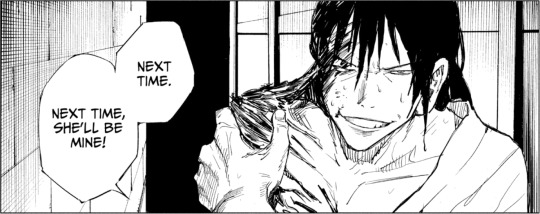
Detention center Special Grade Curse - chapter 8. (temporary)

Mahito - chapter 22. ...Nearly. (temporary)
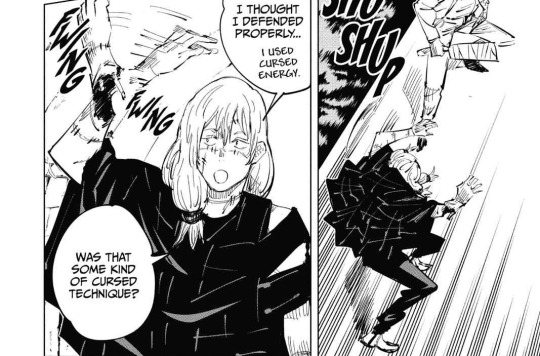
Hanami - chapter 52. Though we don't know it until chapter 53. (temporary)

Eso - chapter 61. (permanent)

Toji - chapter 75. (permanent)

Mahito - chapter 81. (temporary) (*edit 8/10/23)

Jogo - chapter 85. (temporary)
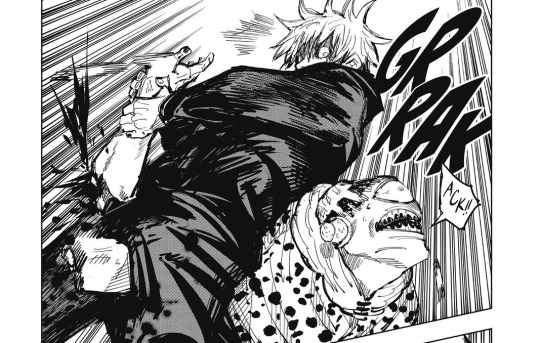
Jogo again - chapter 89. (temporary) (*edit 8/7/23)

Smallpox Hag - chapter 102. (temporary) (*edit 8/16/23)

Naobita - chapter 108. Though we don't know it until chapter 109. (permanent)

Jogo... again - chapter 112. (temporary) (*edit 8/9/23)

Jogo - chapter 115. (temporary) (*edit 8/9/23)
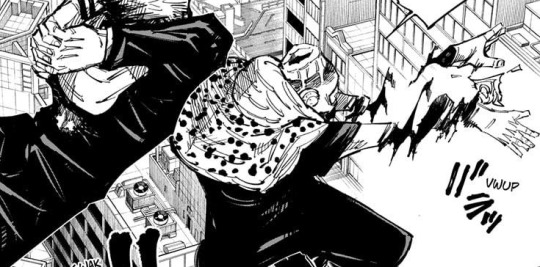
Nanami - chapter 120. Gege went through the trouble of adding his arm falling off for the tankobon release. (permanent) (*edit 8/19/23)

Todo - chapter 130. (permanent)

Inumaki - chapter 119. Though we don't find out until chapter 137. (permanent)

Kukuru Squad who led attack on Maki - chapter 150. (permanent)
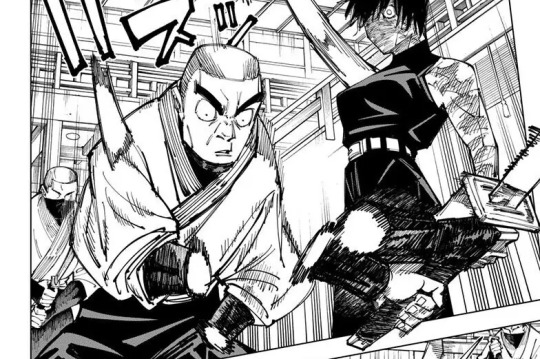
Reggie Star - chapter 172. (permanent) (*edit 8/9/23)

Kurourushi - chapter 175. (temporary) (*edit 8/9/23)

Takako Uro - chapter 179. (permanent) (*edit 7/31/23: ty @mighty-meh)

Kurourushi - chapter 179. (permanent) (*edit 7/31/23: ty @mighty-meh)
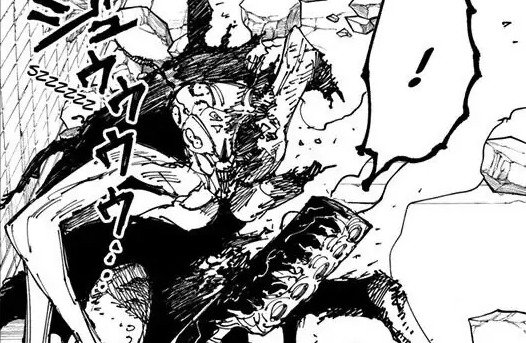
Hakari - chapter 186. (temporary) (*edit 8/10/23)

Hakari - chapter 190. (temporary)
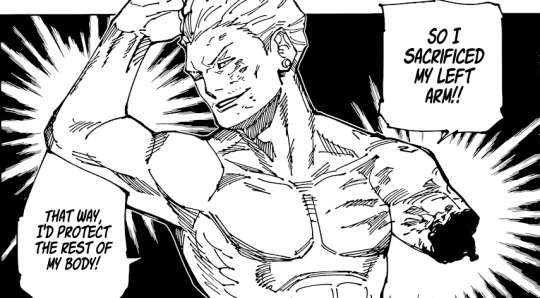
Hagane Daido - chapter 198. (unknown) (*edit 8/10/23)
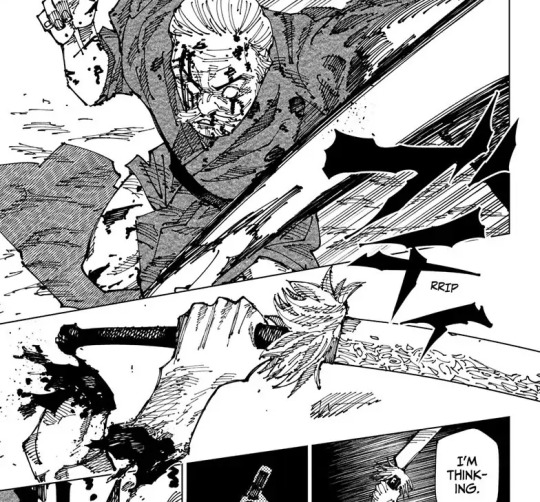
Kenjaku - chapter 205. (temporary) (*edit 7/31/23)
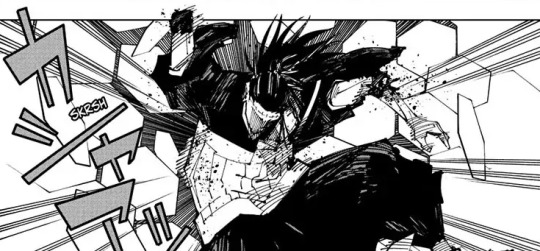
Yuji - chapter 212. Just a pinky this time, but it's (permanent).

Hana - chapter 214. (permanent)

Sukuna - chapter 223. (temporary) (*edit 7/23/23)

Gojo - chapter 234. (temporary) (*edit 9/3/23)
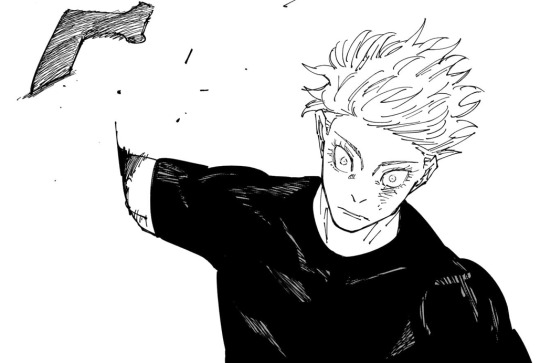
Let me know if I've forgotten anyone else.
(Continued)
#dismemberment#jujutsu kaisen#jjk manga#jjk spoilers#my jjk#jjk meta#poor jogo honestly lol#let's try to be more bloggy shall we
44 notes
·
View notes
Text
Kaidou manga panels I like: (pt 214)
My Disappointment is Immeasurable and My Day is Ruined: feat. Saiki, Kuboyasu, Hairo, and Nendou
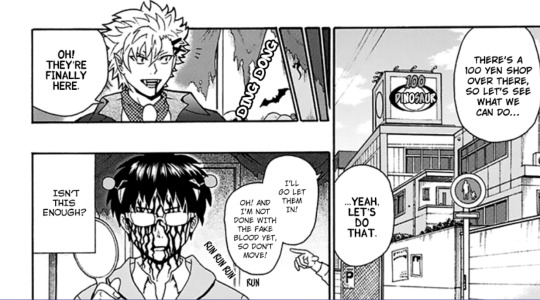
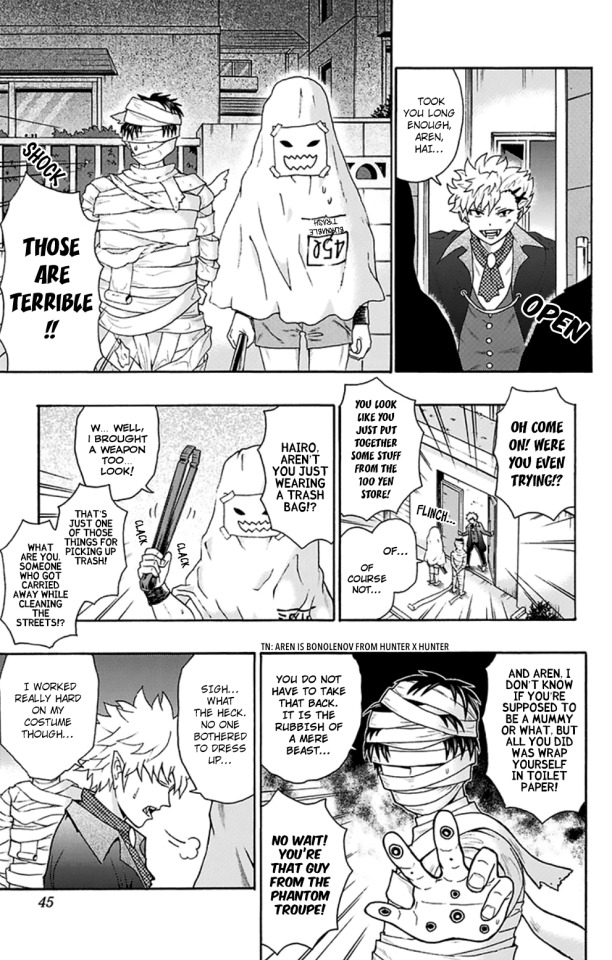
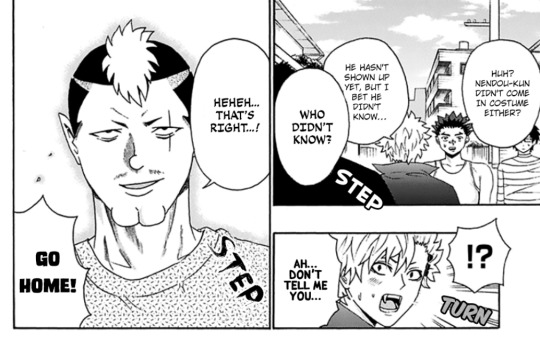
From: vol 12 ch 120
#saiki k#tdlosk#shun kaidou#kaidou shun#kusuo saiki#saiki kusuo#aren kuboyasu#kuboyasu aren#kineshi hairo#hairo kineshi#riki nendou#nendou riki
12 notes
·
View notes
Text

214. We Can't Do Just Plain Love, Vol. 1 - licensed - This TL/josei series about a woman with a scent fetish and her incredibly hot boss who gets flustered about women boasts some of the best porn manga panel layouts I've ever seen. They're both creatively drawn and hot as hell.
17 notes
·
View notes
Photo
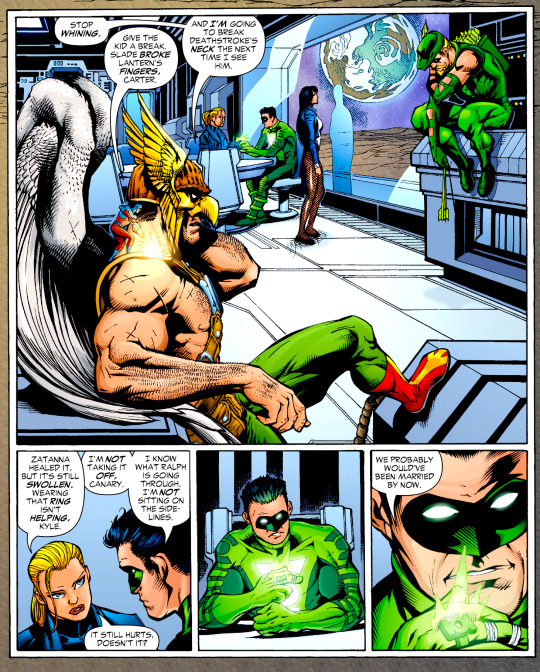



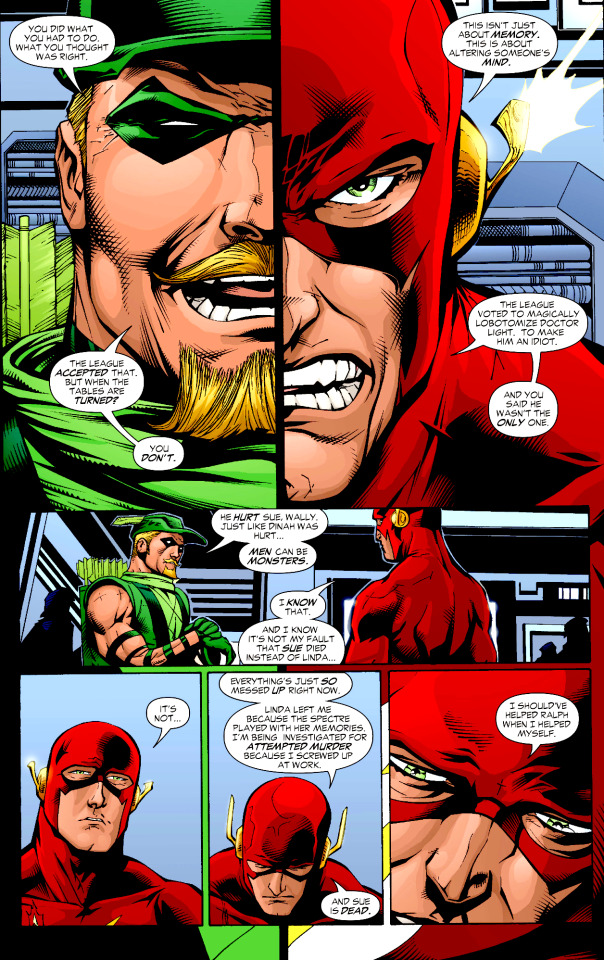
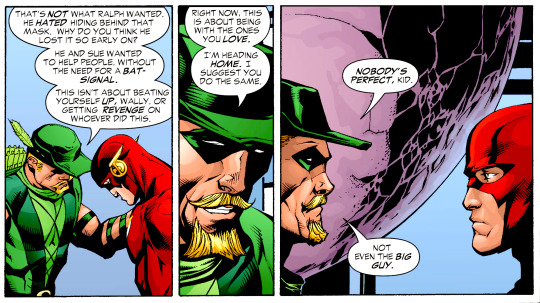
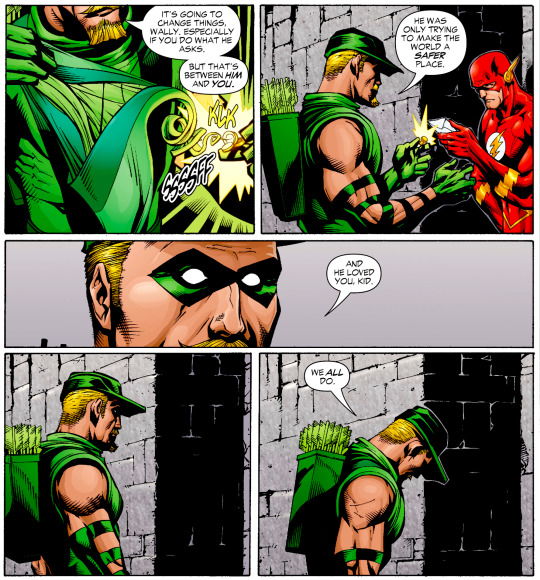
Wally wants some damn answers and he wants them NOW
The Flash vol 2 #214
#wally west#oliver queen#carter hall#dc comics#kyle rayner#zatanna zatara#dinah laurel lance#ray palmer#flash#green arrow#green lantern#hawkman#zatanna#the atom#black canary#dinah lance#dc#JLA#justice league of america#TF vol 2
78 notes
·
View notes
Text
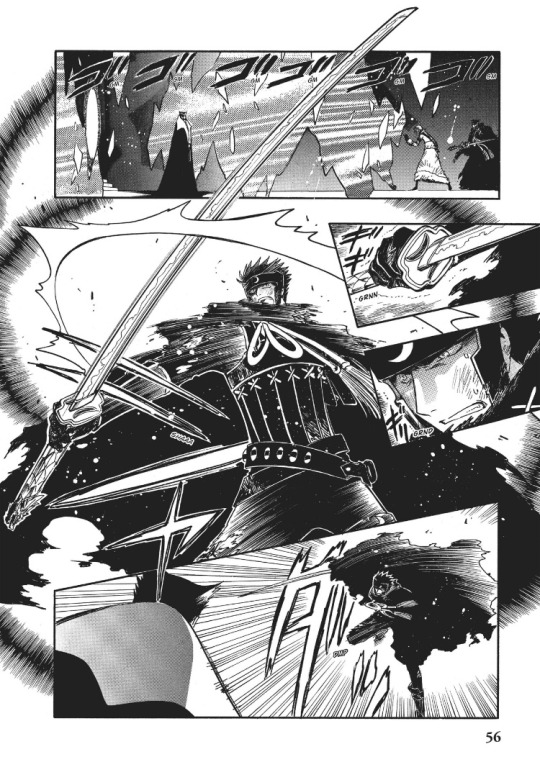
[2]
OH HE’S GOING FOR IT.
It would be so satisfying if he pulled this off, even if it was narratively a little premature. BUT STILL, WE’RE ROOTING FOR YOU ON PRINCIPLE KUROGANE GET THAT MAN.
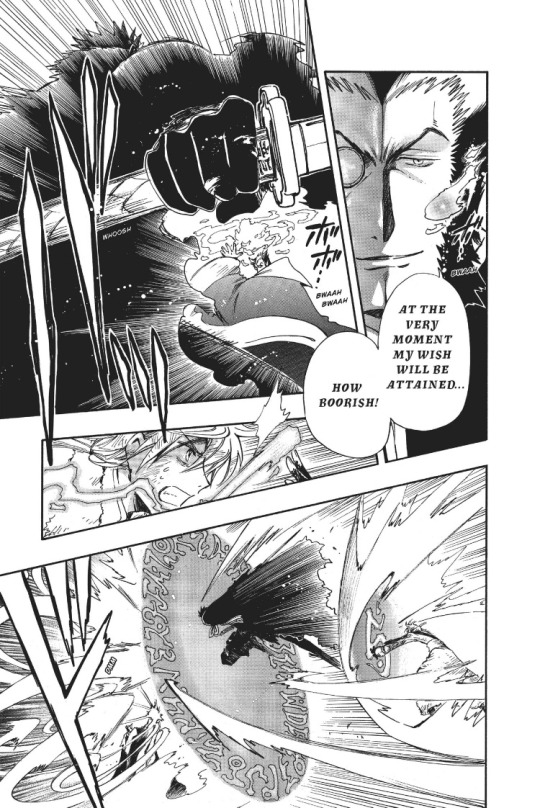
OHHH OHHH THEY’RE GOING HEAD ON. THE DADS ARE RIGHT THERE IN HIS FACE ATTACKING HIM IN PERSON.
I LOVE IT VERY MUCH.
Also? The fact that Fai is using his (mostly offensive) magic defensively to protect Kurogane? And it still kind of takes the shape of an eye? PERFECTION.
The interesting question here is which magic is more powerful; Fai’s already Very Strong Magic levelled up a thousand times through Syaoran's off screen adventures, or ordinary Evil Wolverine?
If Evil Wolverine is still stronger that’s absolutely terrifying.
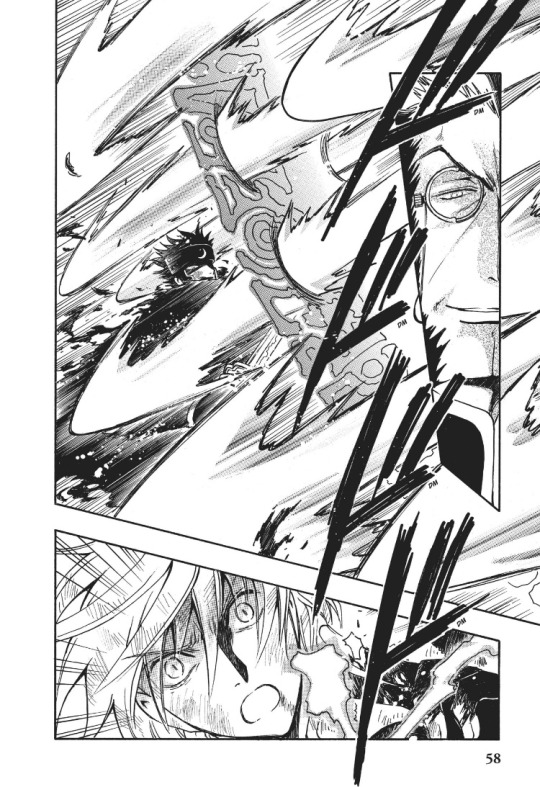
OH! HIS MAGIC CUTS RIGHT THROUGH FAI’S.
I suppose that’s the answer I was asking for but I DON’T LIKE IT.
#OOF#OOOOF#Me: I dont think this will work#Clamp: it doesn’t work#Me: *Shocked Pikachu face*#Liveblogging the reservoir chronicle#Tsubasa#Vol 214#Fai#Kurogane#Evil Wolverine#HAVE WE NOT SEEN KUROGANE GET HIT ENOUGH?#DOES HE REALLY NEED TO BE CUT THROUGH AGAIN?#HOW MUCH KUROGANE WILL WE HAVE LEFT BY THE END
45 notes
·
View notes
Text
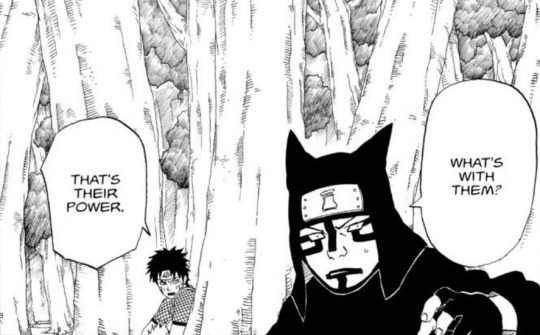
24 notes
·
View notes
Text
FANTASTIC FOUR #220 (1980) John Byrne & Joe Sinnot Cover, John Byrne Pencils, John Byrne Story, Includes a one page alternate cover for Fantastic Four #214 by Joe Sinnott, 1st Appearance Constructs of the Flb'Dbi "
#FANTASTICFOUR #220 (1980) #JoeSinnot Cover, #JohnByrne Pencils & Story, Includes a one page alternate cover for Fantastic Four #214 by Joe Sinnott, 1st Appearance of the Constructs of the #FlbDbi "...And the Lights Went Out All Over the World!" As Ben and Alicia take a cab to the airport to escape the harsh New York winter for a break in the sun, their cab driver worries about the implications for his insurance should a super-villain decide to mount an attack. SAVE ON SHIPPING COST - NOW AVAILABLE FOR LOCAL PICK UP IN DELTONA, FLORIDA https://www.rarecomicbooks.fashionablewebs.com/FantasticFour%202.html#220 #RareComicBooks #KeyComicBooks #MarvelComics #MCU #MarvelUniverse #ComicBooks #NerdyGifts #KeyIssue

#FANTASTIC FOUR#220 (1980) John Byrne & Joe Sinnot Cover#John Byrne Pencils#John Byrne Story#Includes a one page alternate cover for Fantastic Four#214 by Joe Sinnott#1st Appearance Constructs of the Flb'Dbi "#marvel comics#key comic books#key comics#marvel universe
3 notes
·
View notes
Text
Today's Bat: Fringe-Lipped Bat
Your best friend sets you up on a blind date. She says, "He's a real foodie, has great facial hair, and he makes his own cologne!" You're a little apprehensive when you're packed into a Jeep, and become even more so as you're taken out to the Peruvian Amazon. You find yourself alighted to a beautiful stream... the romance in the air crests... and you look up into the face of your date:

Environmental Impact: These guys are fairly omnivorous, though they're best known for eating frogs (more on this in the Power rating). They've got a wide range across northern South America, and are of no conservational concern. Their usefulness knows no bounds: they're a foundational food source for predators, they control pest species like katydids and mosquitos, they provide fertilizer in the form of guano, and they're choice research specimens thanks to their sociable natures and unique behaviors.
🦇🦇🦇🦇🦇/5
Beauty: Look at that mug. Those namesake lip protrusions are a real showstopper. Additionally, Fringe-Lipped Bats are famous perfumeries: they're well-studied for their "forearm crusts", which are orange patches along their wings where they cake a musk-and-fruit scented mixture of glandular secretions and saliva. These crusts are lady magnets (read: sexually selected traits). Researchers have reported locating roosts based on the group's collective odor. If human beings can appreciate the smells of whale vomit and beaver ass, I think we can make room in our hearts for Fringe-Lipped Bat crusts.
🦇🦇🦇🦇/5
Power: As promised, it's time to discuss this bat's superpower. The whiskers aren't just for show: they can sense the presence of poison. This, combined with their ability to differentiate between vocalizations, allows the bat to select only the most delicious frogs. They have the ability to eat nearly anything (including other bats!!), yet they continue to refine their palates. Respect.
🦇🦇🦇🦇🦇/5
Overall: The Fringe-Lipped Romeo is infinitely loveable. I'd highly recommend looking into Merlin Tuttle's research and photography of this species... and honestly, everything else Merlin Tuttle does. No further notes.
🦇🦇🦇🦇🦇/5
(Today's sources: Animal Diversity Web, Animalia, and the following resources borrowed from my local library:
Flores, Victoria, et al. “The Role of Male Forearm Crust Odour in Fringe-Lipped Bats (Trachops Cirrhosus).” Behaviour, vol. 156, no. 15, Dec. 2019, pp. 1435–58. EBSCOhost, https://doi.org/10.1163/1568539X-00003573.
Merlin D. Tuttle, Michael J. Ryan, Bat Predation and the Evolution of Frog Vocalizations in the Neotropics. Science 214, 677-678 (1981).DOI:10.1126/science.214.4521.677)
5 notes
·
View notes
Text
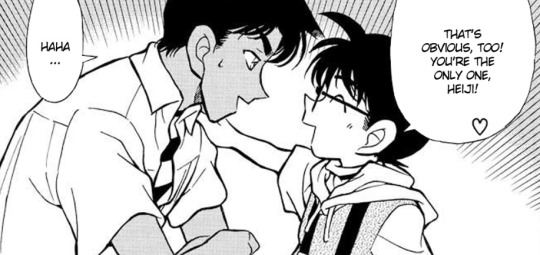
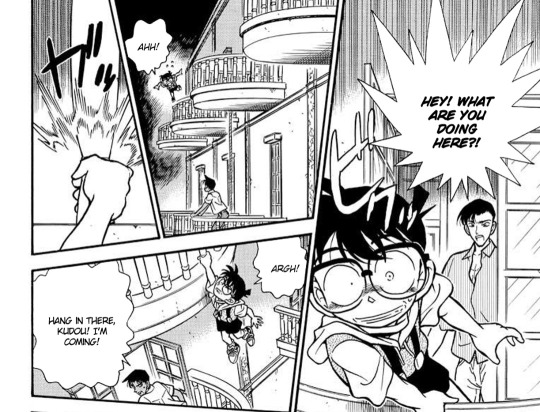
people take one look at conan and think, "man he's pushable". here, the night baron case, movies... he's got a problem
Vol. 22, Ch. 213

Vol. 22, Ch. 214
34 notes
·
View notes